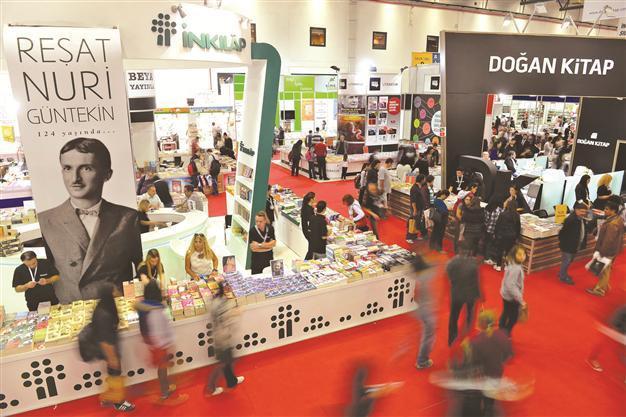Chinese and Turkish literature to discover each other with festival
Çağlayan Çevik ISTANBUL-Hürriyet

Chinese Writers’ Association president Tie Ning says Chinese writers would like to be informed more about Turkish writers. Through dialogue, they want to discover the common issues writers are concerned about. AA Photo
The 32nd International Istanbul Book Fair hosts 650 publishers and will continue for eight days with book-related activities at the TÜYAP Fair and Convention Center in Büyükçekmece. China will be the event’s country of honor at the International Hall from Nov. 2-5. More than 100 publishers from China will be featured at the fair and events will be held with prominent names in Chinese literature. At the same time, representatives from the country’s publishing industry will meet with publishers from Turkey to explore business opportunities. Events organized by the People’s Republic will include interviews, panel discussions, calligraphy workshops, professional meetings and exhibitions.
The Chinese Writers’ Association president Tie Ning explains what she is waiting from the fair and how the association develops each year.
Tie Ning thinks many things have changed in China in terms of culture and literature. “This era, which is constantly changing, readies an important ground for change in China, too. In today’s China, people who work as leaders, directors and managers are getting younger in general. When we talk about literary environment, my presidency should be viewed as the continuation of this juvenescence, because it shows the mature ones are more tolerant and supportive of the youth,” she said.
China was the guest of honor in the Frankfurt Book Fair in 2009 and in the London Book Fair in 2012, and this year and is the guest of honor in the International Istanbul Book Fair. About these latest developments, Tie Ning said, “After decades of development in an enclosed environment, China feels it should urgently open up to the world to show the energy and potential it has. For the past 30 years, while developing economically, China has been trying to obtain cultural welfare, progress and creativity.
Participating in an effective book fair is essential to represent China, to make the world acquainted with the real China. Contact within various civilizations depends on their ability to attract each other’s attention.
Expectations from the fair“We’d like to be informed more about the contemporary works of Turkish writers. Through dialogue, we want to discover the common issues writers are concerned about and the differences,” said Tie Ning, adding, “Of course we hope the participating readers would be interested in the works of Chinese writers and even enjoy reading them. Some material from Chinese writers was recently translated into Turkish. The authors who have been translated into Turkish are outstanding and creative writers in China. I’m hoping new ones will be added.”
Talking about China and literature, “political pressure” and “censorship” are commonly mentioned as well. In some news, coming from ‘western’ sources, some writers are referred to as “civil servants”. “That situation was true for a long time in China, especially during the Cultural Revolution. This created a deep impression in the international community. This situation is explained by many literary works from China and is being analyzed profoundly. But western countries are prejudiced against China and other developing countries. Describing today’s China with a prejudice indicates that there’s something missing regarding knowing China.”
Tie Ning also added the Chinese Writers Association has more than nine thousand members. “98% of these members consist of writers who have their own profession, like professors, corporate employees or editors. Only the remaining 2% are professional writers who are supported by the government budget and these are elderly writers from the old planning system. They said ‘the civil servant writers’ simile is an indicator of a preconception.”
Orhan Pamuk and Chinese literatureCompared to other Turkish writers, more books by Orhan Pamuk have been translated into Chinese. The best way to know a society is to follow its literature. I learned about Turkey through some of Pamuk’s books. I like My Name is Red and Istanbul. We were at a dinner with Pamuk, during his visit to China in May 2008, where we had literary talks with other Chinese writers. What created a deep impression on me was this: there had been a destructive earthquake that month in the Wenchuan district of China. Pamuk, who knew about this earthquake before his visit, e-mailed the organization asking for concrete information about the disaster and expressed his deepest sorrow.
Upon his arrival, he asked that the income from the planned book signings and sales in Beijing and Shanghai to be donated to the earthquake zone. All the revenue from the book sales was used to help the university students who came to Beijing from the disaster area to study.
